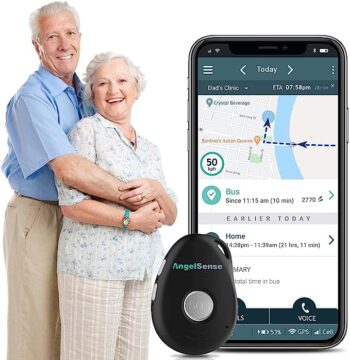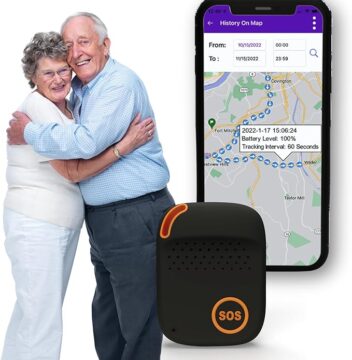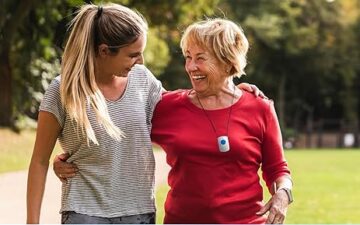The products and services mentioned below were selected independent of sales and advertising. However, Simplemost may receive a small commission from the purchase of any products or services through an affiliate link to the retailer's website.
If you have an elderly loved one, you know there’s often a tricky balance at play. On one hand, you want to honor their dignity and desire for self-sufficiency. On the other, you may be concerned by a recent fall or an episode of lost bearings. Maybe a doctor has even suggested some sort of continuous monitoring.
A wearable GPS tracker for seniors may be a solution that both you and your loved one can live with. It can track their location based on satellite data, remind them to take medication, or alert the authorities if they experience an emergency. But there are many alert systems available, and you need to ask some questions in order to choose the right tracker. Starting with: Will they remember to wear it?
“A GPS tracker is only effective if it’s worn consistently,” says Jennifer Avila, a certified dementia practitioner and the executive director of Custom Home Care. “It can’t track if it’s sitting on the bedside table!”
Do you think your loved one is likely to remove the device when sleeping or showering and forget to put it back on? Then forgo a smartwatch and opt instead for a pendant on a necklace. Or, maybe your senior is resistant to the idea altogether. In that case, there are devices available in jewelry form (like an attractive necklace, bracelet or keychain) whose main purpose can be easily disguised. They can even have a GPS tracker inside the soles of their shoes.
Here, some gerontologists and dementia experts explain the factors to keep in mind when buying a GPS tracker. Plus, they offer their opinions on the top models on the market right now.
What To Look For When Buying A GPS Tracker for Seniors

No matter what function you want the tracker to provide, it needs to be uncomplicated and straightforward.
“It’s essential that the device be user-friendly for seniors and caregivers,” says Susan Williams, a registered nurse specializing in gerontology and elderly care, and a senior health contributor at Retirement Being.
In other words, it should work without the senior having to turn it on, and the emergency call for help button should be obvious and easy to access. Williams also notes that the best trackers have a long battery life to minimize the need for frequent recharging.
“When buying a GPS tracker, it’s important that it can be attached discreetly — be it attached to an item of clothing that they don’t usually take off, or to their body part like their wrist or ankle,” says Dr. Ryan Peterson, a board-certified physician and a specialist at NuView Treatment Center, a leading behavioral healthcare provider in Los Angeles, CA. “You should also look into integration to your phone or laptop so you can monitor it remotely with alerts if they step out of the residence or assisted-living facility.”
Best GPS Trackers for Seniors
Lifeline On the Go Mobile System

$99.95 (then $49.95/month) at Lifeline
“Lifeline was one of the first medical alert systems ever created, and they are still the leading system on the market,” says Avila.
Your senior never has to take this pendant off, even in the shower. And the SOS button couldn’t be easier to access. If he or she loses their bearings, they can simply press the button for instant help from a trained care specialist. While most trackers rely solely on GPS to track the device, Lifeline also uses other technologies like Wi-Fi and two-way voice communication with the agent.
While the company recommends placing the device in the charging station on a daily basis, the battery can purportedly last up to four days. Avila concedes that Lifeline is also one of the more expensive options on the market. But it does offer fall detection — an excellent feature which calls an agent for help after a tumble, even if the senior is unable to do so themselves.
Jiobit Gen 3 GPS Tracker

$129.99 at Amazon (then $8.33/month)
The Jiobit Gen 3 is merely a tracking device, but it’s a good one. It uses a combination of GPS, Wi-Fi and Bluetooth technologies to make sure you can locate a missing senior. When this lightweight, waterproof device is clipped onto a senior’s clothes or a bag, their location can be tracked on their caregiver’s phone.
Avila prefers medical alert options with an SOS button (which this tracker doesn’t have), but she does note that “this device could be helpful to place in the car of a senior who is still driving, in the event that they get lost, are not responding to their phone, and don’t share phone location with their family or loved ones.”
Medical Guardian MGMove Smartwatch

$199.99 at Amazon (then $39.95/month)
The Medical Guardian MGMove Smartwatch is a higher-end option, but its features might make it worth the expense. It has many of the functions and settings you get in any smartwatch, like the weather and fitness tracking capabilities. But it also has features that could save an elderly person’s life.
“I think the price is justified for this smartwatch,” says Dr. Peterson. In particular, he cites the fall detection capabilities, the heart rate monitor and an emergency service alert system.
If you’re looking for a smaller option, Medical Guardian also makes the MGMini medical alert necklace — which has all the same features but in a pendant on a necklace.
“I think this model is ideal for caregivers seeking a more discreet or subtle way of monitoring their senior patients,” says Dr. Peterson.
AngelSense Life Saving Alert System

$59 at Amazon (then $49.99/month)
The AngelSense Life Saving Alert System has an easy-to-use call button on a fob that you can attach to a bag, belt loop or pocket. Set the SOS button so that when your senior presses it, you (or any caregiver you choose) will get a call immediately. There’s a two-way speakerphone that will allow your senior to talk to you in the moment.
“I think this is helpful more on the tracking feature for senior patients,” says Dr. Peterson. “Not really a great choice for health monitoring, but good for senior patients who have dementia who tend to wander around and have no way of knowing their way back home.”
SecuLife SOS GPS Tracker

$49 at Amazon (then $17-$19/month)
The SecuLife SOS Tracker has similar features to the AngelSense tracker (like the programmable SOS button and the two-way speakerphone) at a more affordable price. Only $49 for the device, it’s just $17.10 per month if you prepay for 12 months of service, and $19 per month if you prepay for three months of service.
“It’s cost-effective,” says Dr. Peterson, “but it’s not that ideal for caregivers needing comprehensive health monitoring and tracking for their senior patients.”
ADT Medical Alert On-The-Go Mobile Device

$79.99 at Amazon (then $36.99/month)
This device can be worn as a bracelet or a pendant on a necklace, and your loved one can push the button on the front to call an ADT Medical Alert agent for help. They will provide assistance, contact caregivers and medical authorities if needed.
One caveat: The wearable device only works within about 100 feet of the base unit. So it’s not a great option for a very active senior.
“It’s practical in an apartment or smaller home,” says Avila. “But if a senior is leaving the house, they need to take the base unit with them in order for the device to work outside of the home.”
InvisaWear Smart Jewelry

$149 (then $14.99/month) at Amazon
Not everyone feels comfortable with a personal safety device swinging from their neck. If your senior would prefer an actual necklace or bracelet in silver or gold,InvisaWear may be the perfect option. And it uses technology from ADT.
“These pieces of jewelry are a dignified alternative to more traditional medical alert devices,” says Avila. While these necklaces are commonly marketed to women looking for some peace of mind when walking alone, it can work for a senior who needs help, too.
Just press the necklace pendant firmly two times, and it will instantly text up to five friends or family members, sending them a link to your exact location. You can also set it up to call 911 at the press of the button.
Frequently Asked Questions About GPS Trackers for Seniors

Does insurance cover GPS trackers?
“Unfortunately, most insurance plans, including Medicare, do not cover the cost of GPS trackers,” says Williams. Nonetheless, it’s worth a phone call to see if yours might at least offer a discounted price. And Avila notes that AARP members are eligible for deals on some medical alert systems.
Does a GPS tracker for a senior need fall detection?
Fall detection is a feature that alerts caregivers immediately if a fall occurs, even if the senior doesn’t call you. Fall-related injuries are common among the elderly, so this feature really does offer a significant benefit.
“It adds an extra layer of safety, potentially accelerating emergency response when needed,” says Williams.
How do you know when to get a GPS tracker?
If you’re considering a GPS tracker, you’ve probably experienced a disconcerting incident with your loved one. Maybe you’ve noticed signs of wandering or confusion.
“Other signs might include difficulty finding their way back from a walk or expressing a desire to go home when they are at home,” says Williams.
Peterson suggests a GPS tracker when a patient is “no longer lucid or is waning in and out of lucidity, and has a propensity to be confused and disoriented, causing them to wander around and be lost.”
While he would prefer to see a caretaker keep a continuous eye on them, he realizes that this isn’t always feasible. He views the GPS as “a safety net when a patient with dementia is lost.”
Finally, trust your gut if you think it’s time, because the signs won’t always be straightforward.
“As a dementia specialist, I have seen seniors with no history of wandering away suddenly getting lost or losing direction,” Avila says. Being prepared for that possibility can put your mind at ease.
The best GPS trackers for seniors originally appeared on Simplemost.com


